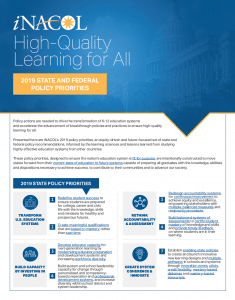iNACOL’s 2019 State and Federal Policy Priorities ‒ Equity-Driven and Future-Focused
Education Domain Blog
 Today, iNACOL (@nacol) published its iNACOL 2019 State and Federal Policy Priorities, an equity-driven, future-focused set of recommendations to drive the transformation of our nation’s K-12 education systems to meet the needs of every student.
Today, iNACOL (@nacol) published its iNACOL 2019 State and Federal Policy Priorities, an equity-driven, future-focused set of recommendations to drive the transformation of our nation’s K-12 education systems to meet the needs of every student.
Our current, traditional K-12 education systems are not adequate to prepare all students for success after high school. The problem is clear from educational data across America. As measured by the National Assessment of Educational Progress (NAEP), the Nation’s Report Card, only 25 percent of 12th graders are proficient (or higher) in mathematics and 37 percent are proficient (or higher) in reading.
Regrettably, to address this issue, most policy is narrowly focused on short-term tweaks or initiatives that fail to address the root causes of these gaps and inequities, and often lead to short-term improvements for only a few students, if at all. Systemic approaches to change and align our education policy at the federal and state level are needed to ensure all students are achieving high levels of mastery to prepare them with the knowledge and skills for future success.
We believe solving this problem and providing equity for all students is possible and a moral imperative.
To address it, policymakers need to partner with local stakeholders to set a vision for the future of education that is fit for purpose – for students, for communities and for society – with an aim toward long-term success for all. With clarified vision, educational leaders can catalyze systemic transformation in K-12 education, align policies to prepare and meet the needs of each and every student.
For state policymakers, the 2019 policy priorities recommend state leaders:
- Redefine student success to prepare all students for college, career and civic life;
- Create meaningful qualifications based on mastery;
- Redesign accountability systems for continuous improvement;
- Build aligned, balanced systems of assessments to certify knowledge and skills;
- Develop educator capacity for next-generation learning;
- Build system and school leadership capacity for change; and
- Establish enabling state policies to create and launch innovative learning models and multiple pathways.
For federal policymakers, the 2019 policy priorities recommend federal leaders:
- Launch a pilot program in the reauthorization of the Higher Education Act to support innovation;
- Remove barriers for states in ESSA Section 1204 (Innovative Assessment Pilot);
- Support continued expansion of Internet access and broadband infrastructure; and
- Target funding within the reauthorized Perkins Career and Technical Education Act.
To learn more about these recommendations, download the iNACOL report, iNACOL 2019 State and Federal Policy Priorities, and access related issue briefs here:
- State Funding Strategies to Support Education Innovation
- State Policy & K-12 Competency-Based Education
- Innovation Zones: Creating Policy Flexibility for Competency-Based Personalized Learning
- Redesigning Systems of Assessments for Student-Centered Learning
- Redefining Student Success: Profile of a Graduate
- Rethinking State Accountability to Support Personalized, Competency-Based Learning in K-12 Education
- State Strategies to Develop Teacher Capacity for Personalized, Competency-Based Learning
- Course Access: Providing Equitable Access to High-Quality Learning Opportunities